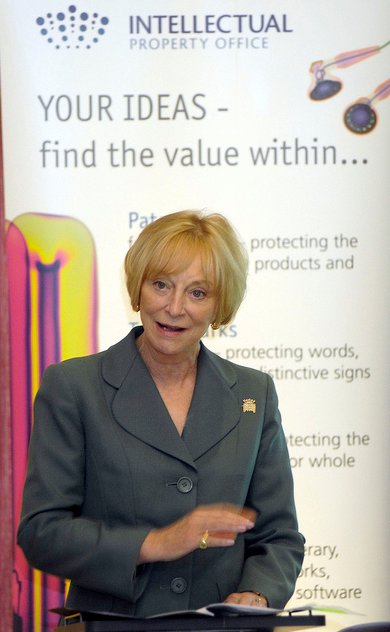

Credit: Department for Business, Innovation and Skills (BIS)
Horns is an informative blogger (not just a European patent attorney from Germany) who often sheds light on important issues such as UPLS [1, 2, 3]. But there is one point that he overlooked a little while ago when he debated the patentability of software (an important subject in Germany due to Microsoft and Siemens [1, 2]).
He says that there is a “myth” of software patents being used as a tool of dispossession against the copyright programmers earned by writing something. This is a “myth”, in his view, since programmers need to check for patents, just as someone who wants to build somewhere needs to check the property status of the real estate in question.
He then goes on, however, to explain that it is actually impossible for most software authors to do the patent check. That means he is refuting his own point.
The Intellectual Property Minister Baroness Wilcox has unveiled a research programme into intellectual property and its value to the British economy
[...]
Wilcox said: “Intellectual property has a key role to play in rebalancing the British economy. The highly-skilled industries where the UK can excel are driven by innovation.
“Britain must have an intellectual property system that encourages innovation and is internationally competitive.
Lexmark sues importers of laser cartridges for patent infringement
Lexmark International, Inc. (NYSE: LXK) announced today that it has filed a patent infringement complaint with the United States International Trade Commission (ITC) against 24 companies engaged in the manufacture, importation and sale of replacement cartridges for various Lexmark laser printers and multifunction devices.
The complaint alleges that these replacement cartridges infringe at least 15 U.S. patents owned by Lexmark. Lexmark is requesting that the ITC issue a general exclusion order banning the importation and sale of patent infringing laser cartridges by any entity.
Good news in the fight against bad software patents: a jury in the Eastern District of Texas recently found the Firepond/Polaris patent (U.S. Patent No. 6,411,947) invalid. This patent was on EFF's "Most Wanted" list, targeted because it claimed nothing more than a system using natural language processing to respond to customers' online inquires by email.
EFF was not involved in this case, in which Bright Response, LLC — the technical owner of the patent — sued Google, Inc., Yahoo!, Inc. and eight other companies, alleging that Google's AdWords and Yahoo!'s Sponsored Search infringes the Firepond/Polaris patent. The jury found three of the patent's claims invalid based on the public use bar, obviousness, and for lacking written description. The jury also found that neither Google nor Yahoo! infringed those claims. Finally, the jury found the entire patent invalid due to improper inventorship.